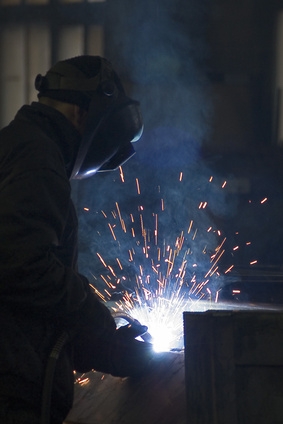
Processes that involve the cutting of metal use various methods to remove material from the metal to separate the desirable portions of metal from the undesirable. In addition to mechanical methods which use metal saws, drills and grinders to remove material, heat and electrical energy can be used to produce cuts. These methods have the benefits of producing fast cuts in tough metals and reduced wear on the tools used.
Oxy-acetylene torches cut metal by using oxygen to burn metal. An acetylene flame is used to heat the metal to ignition temperature and then adds oxygen to increase the temperature of the flame and burn away the metal to be removed. The heat of the oxygen flame causes elements in the metal under the flame to oxidize in a chemical reaction. The pressure of the oxygen flame exiting the torch forces the burnt metal away from the cutting path and results in the separation of the metal. Oxy-acetylene torches only work on metals that are readily oxidized, which excludes copper and aluminum.
A plasma cutter uses ionized gas discharged at high velocity from a small orifice to melt metal. The ionized gas conducts electrical energy from the torch to the metal, which ignites the ionized gas and creates plasma. The superheated plasma melts the metal in its path and the high pressure of the gas as it exits the cutter blows the molten metal away from the cutting path, separating the metal. Plasma cutters rely on mechanical cutting of metal by melting and forcing the molten metal away from the work area rather than burning metal away, which makes plasma cutters effective for any metal that will conduct electricity.
Laser cutters work by melting metal in the path of a thin, tightly focused beam of intense energy to heat a highly localized area which melts and vaporizes the metal it comes into contact with. Material burnt or melted by the laser is then either blown away with high pressure gases or vaporizes, resulting in the separation of the metal. Laser cutters are most often computer-controlled to produce a clean and accurate cut and are used in applications where precise and intricate cutting of metals and other materials is necessary.